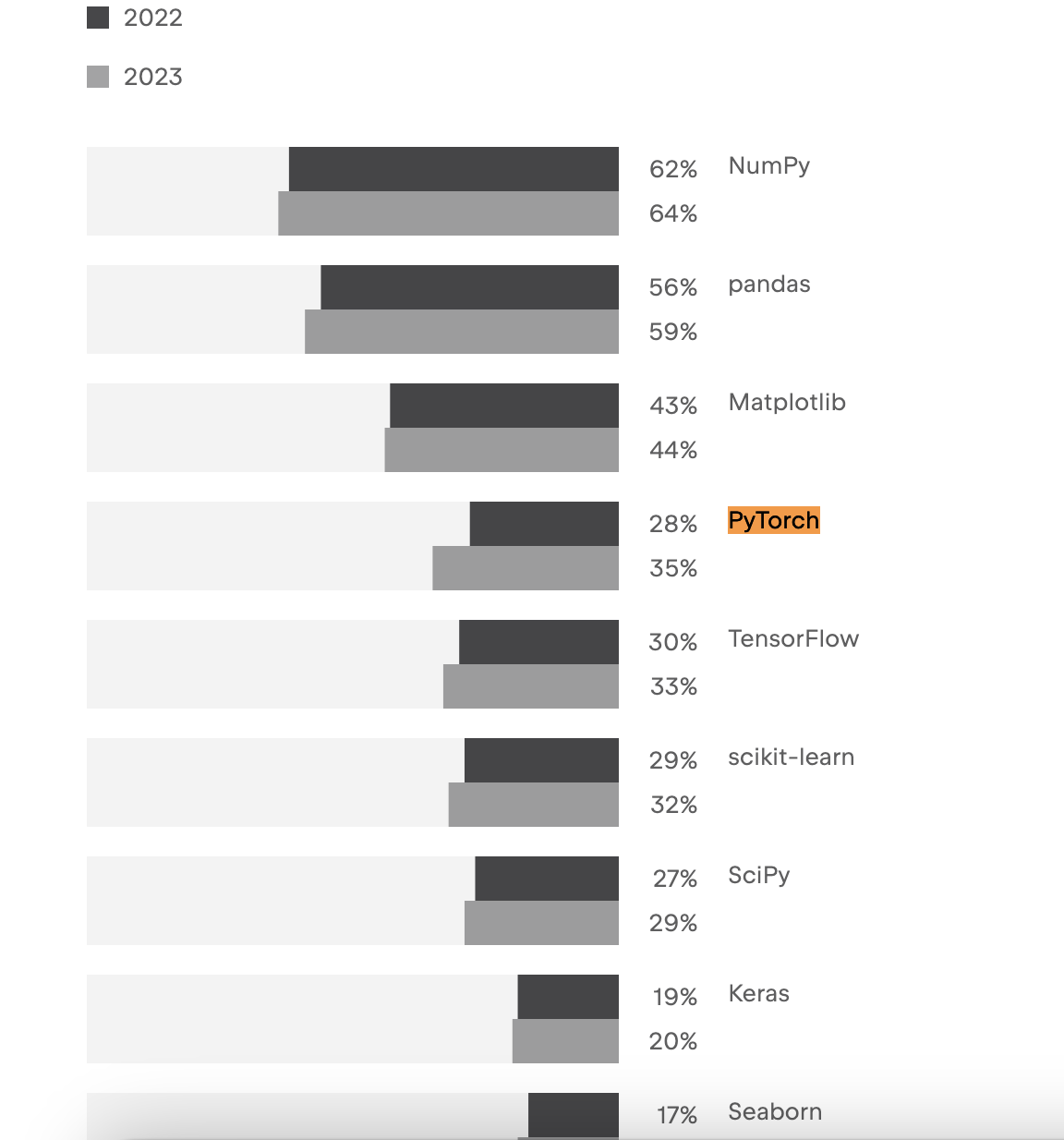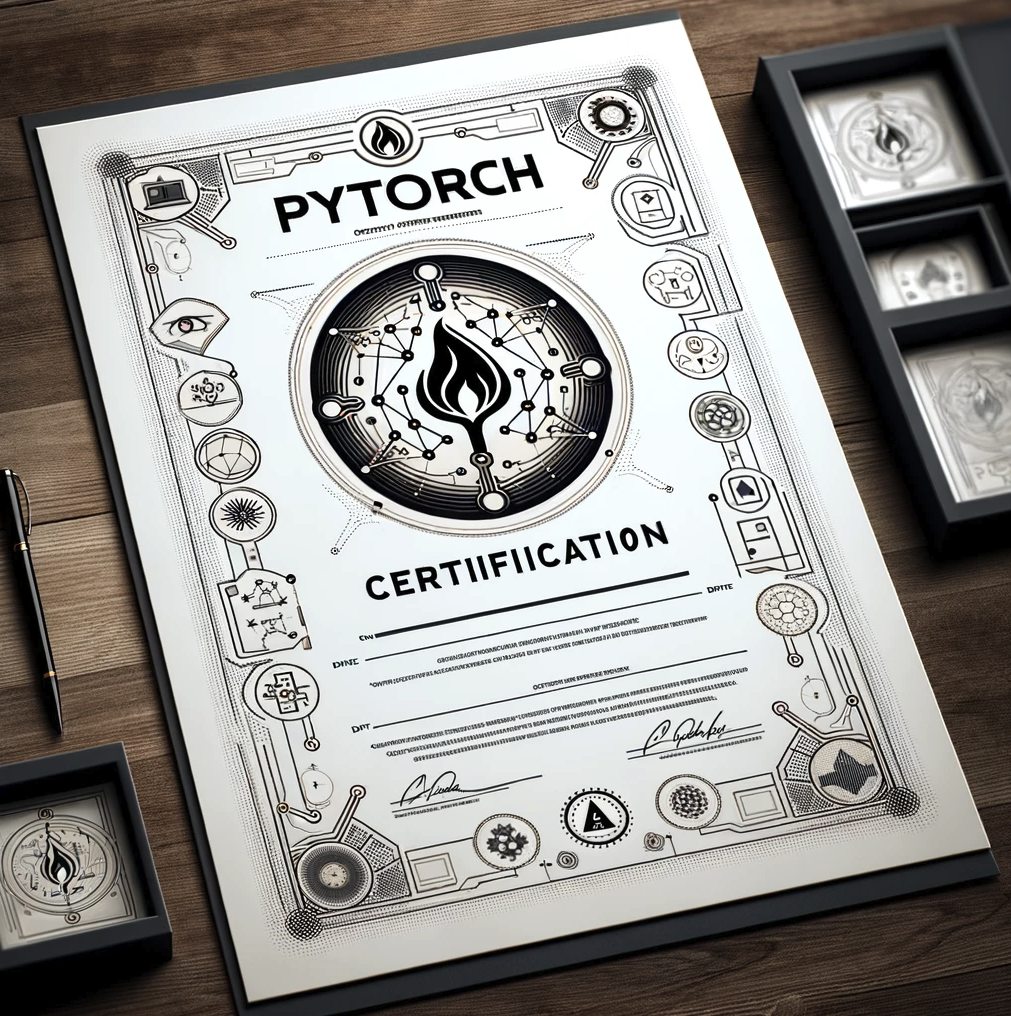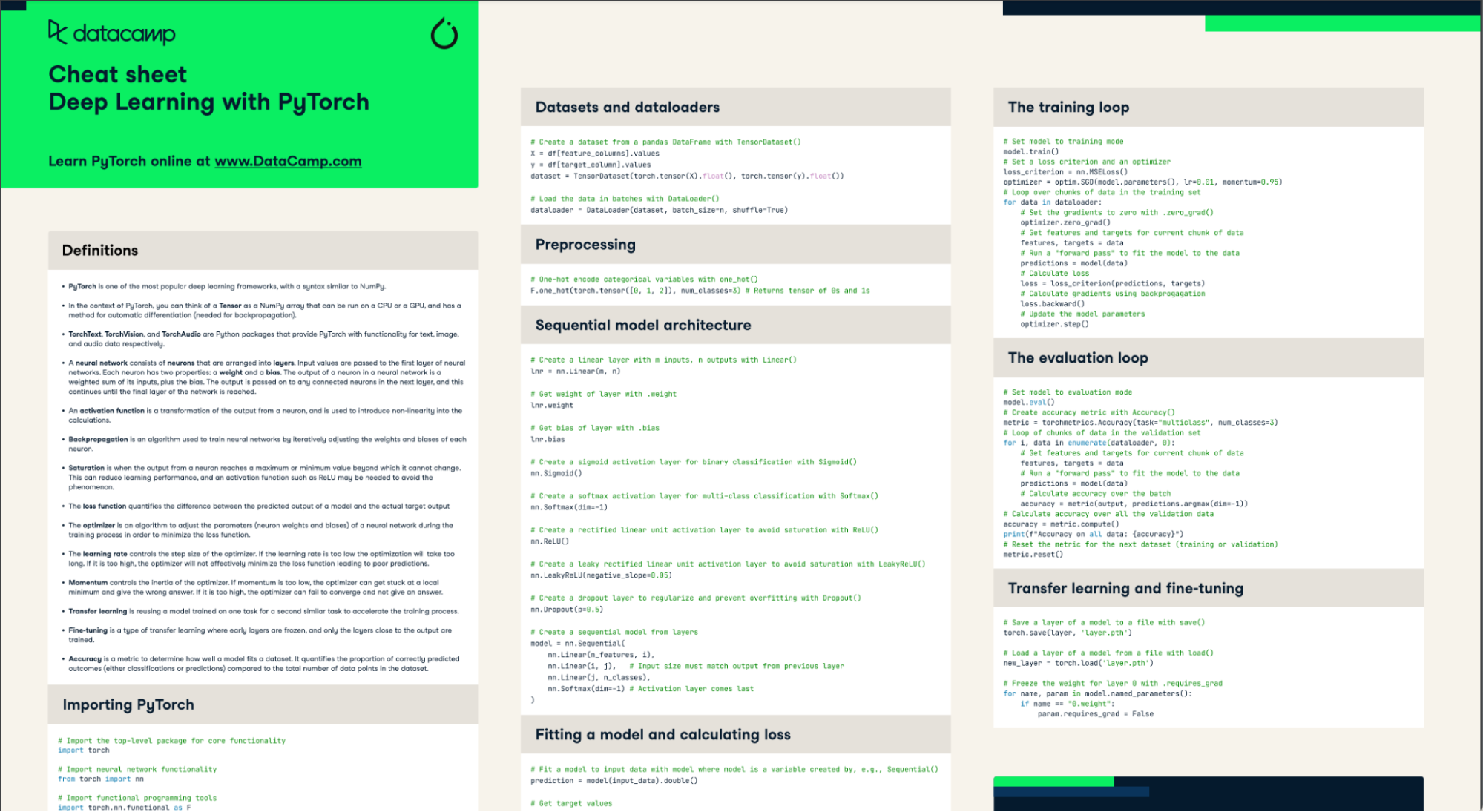Track
In the ever-evolving field of artificial intelligence, PyTorch has emerged as a leading platform for developing machine learning and deep learning models. This article serves as a comprehensive guide to understanding PyTorch certificates and certifications. We'll delve into the utility of learning PyTorch, distinguish between certifications and certificates, explore top courses, and discuss the broader context of data & AI certifications.
Why is Learning PyTorch Useful?
Learning PyTorch is not just about mastering a programming library; it's about unlocking a world of opportunities in the fields of machine learning (ML) and deep learning (DL). These technologies are at the heart of innovations in AI, from autonomous vehicles to personalized medicine, making skills in these areas highly sought after.
Machine Learning & Deep Learning Provide Great Careers
Machine learning and deep learning careers offer promising prospects with significant opportunities for growth and high salaries. The fields of artificial intelligence (AI) and machine learning (ML) are rapidly expanding, with AI and machine learning jobs having increased by almost 75 percent over the past four years. This trend is expected to continue, making careers in these areas highly sought after and lucrative.
Looking at job data, we can see that machine learning engineers, one of the top roles within AI, have an impressive median salary. For example, the salary for a machine learning engineer can reach up to $200,000, with many positions in the AI and ML fields paying well over $100,000. These roles are not only financially rewarding but also pivotal in driving technological advancements across various industries, from healthcare and education to finance and retail.
Furthermore, the job outlook for machine learning and artificial intelligence is extremely promising, with a significant growth in demand for professionals skilled in these areas. According to the U.S. Bureau of Labor Statistics, computer and technology occupations are expected to grow by about 15% from 2021 to 2031, which is much faster than the national average for all occupations.
PyTorch is the Most Popular Deep Learning Library
PyTorch, with its intuitive interface and dynamic computational graph, has become a favorite among researchers and developers alike. Its popularity is not just anecdotal; many developer surveys & package download statistics point to PyTorch being one of the most popular machine learning & deep learning libraries alongside the likes of scikit-learn, TensorFlow, and Keras. PyTorch has nearly 400,000 active users on GitHub, along with 75.4k stars.

The most popular Python data science frameworks, showing the growth in popularity of PyTorch - source
PyTorch Certifications & Certificates
While PyTorch itself does not offer formal certifications, the landscape is rich with certificates and courses designed to equip anyone with hands-on skills in using PyTorch for machine learning and deep learning projects. Before going into these courses, it’s worth demystifying certifications vs certificates.

Created using DALL-E 3
PyTorch Certifications vs. PyTorch Certificates
It's crucial to distinguish between certifications and certificates. Certifications often involve a comprehensive assessment by a recognized body, while certificates typically signify the completion of a course or series of courses. In the context of PyTorch, while formal certifications are not available, numerous high-quality certificates can significantly bolster your expertise and resume. More importantly, there are many role-specific certifications that encapsulate PyTorch & other data & AI tools, as we’ll explore later on in the article.
Top PyTorch Certificates & Courses
Embarking on a learning journey with PyTorch doesn’t have to be daunting! Below is a list of hands-on DataCamp courses & certificates to get you started with PyTorch.
Deep Learning in Python Skill Track
- What is it?: A comprehensive learning track on deep learning with PyTorch in Python, covering foundational to advanced concepts.
- Duration: 16 hours.
- Key skills learned: Building and deploying deep learning models across various applications using PyTorch.
- Instructor: Multiple instructors, each specializing in different aspects of deep learning.
- Cost: Included as part of DataCamp Premium, starting at $12.42/month
- Certificate earned: Statement of Accomplishment upon completion.
Intermediate Deep Learning with PyTorch Course
- What it is: A course on advanced deep learning techniques using PyTorch, focusing on CNNs and RNNs.
- Duration: Approximately 4 hours.
- Key skills learned: Training robust neural networks, implementing architectures, regularization, dropout, learning rate scheduling, image classification, time series prediction.
- Instructor: Michał Oleszak, Machine Learning Engineer
- Cost: Included as part of DataCamp Premium, starting at $12.42/month
- Certificate earned: Statement of Accomplishment upon completion.
Introduction to Deep Learning in PyTorch Course
- What it is: An introduction to deep learning with PyTorch, teaching how to build neural networks and adjust hyperparameters for classification and regression problems.
- Duration: 4 hours.
- Key skills learned: Understanding deep learning vs. machine learning, neural network training, creating loss functions, leveraging TorchMetrics for model evaluation, solving classification and regression with deep learning on tabular and image data.
- Instructor: Maham Khan, Senior Data Scientist
- Cost: Included as part of DataCamp Premium, starting at $12.42/month
- Certificate earned: Statement of Accomplishment upon completion.
Deep Learning for Text With PyTorch Course
- What it is: A course on applying deep learning to text processing with PyTorch, covering text preprocessing, encoding, and model building for classification and generation.
- Duration: 4 hours.
- Key skills learned: Text preprocessing techniques (tokenization, stemming, lemmatization), using CNNs and RNNs for text classification, text generation with RNNs and GANs, leveraging pre-trained models for text classification, understanding Transformer architecture.
- Instructor: Shubham Jain, Data Scientist
- Cost: Included as part of DataCamp Premium, starting at $12.42/month
- Certificate earned: Statement of Accomplishment upon completion.
Deep Learning for Images with PyTorch Course
- What it is: A course dedicated to applying PyTorch for image-related tasks such as classification, object detection, segmentation, and image generation using deep learning models.
- Duration: 4 hours.
- Key skills learned: Image classification with CNNs, object detection with bounding boxes, image segmentation with masks, and image generation with GANs.
- Instructor: Michał Oleszak, Machine Learning Engineer
- Cost: Included as part of DataCamp Premium, starting at $12.42/month
- Certificate earned: Statement of Accomplishment upon completion.

Prepare for PyTorch Certification with our Deep Learning with PyTorch cheat sheet
Beyond PyTorch: Role Certifications
While tool-based knowledge is invaluable, the broader landscape of AI and machine learning careers often values role-based certifications even more. Understanding the interplay between tool proficiency and role-based expertise can guide your learning path toward more strategic and impactful directions.
The Value of Tool-Based Certifications
Tool-based certifications, such as those offered by AWS, Tableau, or Azure, validate your technical skills and proficiency in specific platforms or technologies. They are particularly useful for demonstrating expertise in tools that are widely adopted across industries. However, their drawback is that they focus on utilizing these exact tools rather than the meta-skills required to succeed in a particular role.
The Value of Role-Based Certifications
Role-based certifications, on the other hand, assess your ability to perform specific job functions and are designed to prepare you for particular roles within the tech industry. These certifications often carry significant weight as they imply a comprehensive skill set that extends beyond the use of individual tools.
Role-Specific Certification with DataCamp
DataCamp delivers specialized certifications tailored to the unique roles within the data profession, ensuring you can validate your expertise and bolster your position in your chosen career path. DataCamp offers these certifications to Premium subscribers for free.
Data Analyst Certification
- Intended Audience: This certification is perfect for professionals keen on mastering data analysis through Python, R, SQL, and Tableau.
- Core Learning Domains: It encompasses critical areas such as data manipulation, visualization, and statistical analysis, arming participants with the capability to extract valuable insights from data.
- Program Composition: Featuring a mix of instructional courses, practical exercises, and project work, this certification guarantees a thorough grasp of data analysis principles.
Data Scientist Certification
- Intended Audience: Aimed at aspiring data scientists, this certification focuses on essential skills such as statistical analysis, machine learning, and data wrangling.
- Core Learning Domains: The curriculum spans a broad spectrum, from exploratory data analysis, machine learning, and deep learning, to specialized areas like natural language processing (NLP).
- Program Composition: It offers a deep dive into data science practices and tools, complemented by hands-on project experience to cement the learning.
Data Engineer Certification
- Intended Audience: Geared towards individuals passionate about data engineering, this certification concentrates on developing scalable data infrastructures and pipelines.
- Core Learning Domains: Participants will explore big data processing, utilize data engineering tools (such as Spark), and learn about database management.
- Program Composition: The certification merges theoretical insights with practical applications, equipping learners to construct effective data storage and processing systems.
Through these certifications, DataCamp not only verifies your skills but also significantly enhances your professional credibility, offering a structured pathway to mastering your role-specific capabilities in the data field.
Get certified in your dream data role
Our certification programs help you stand out and prove your skills are job-ready to potential employers.

Closing Thoughts
Diving into the world of PyTorch and AI can be a transformative journey for your career. Whether you choose to pursue certificates in specific tools like PyTorch or broader role-based certifications, the key is to learn and apply your skills to real-world problems continuously. Remember, in the rapidly advancing field of AI, your learning journey is just as important as the credentials you earn along the way.
Get started on your way to PyTorch mastery today with our Deep Learning in Python Skill Track, which will continue your machine learning journey into deep learning, covering the various uses of PyTorch.



